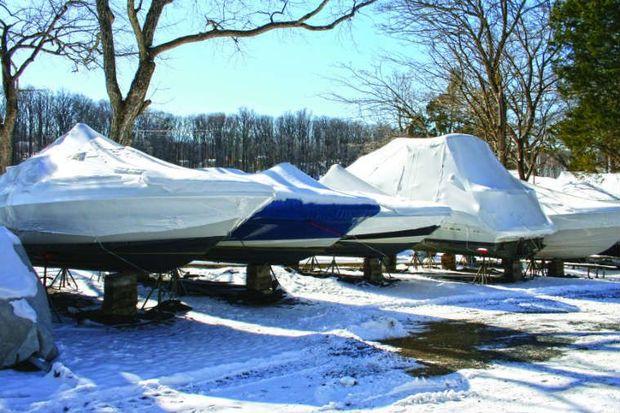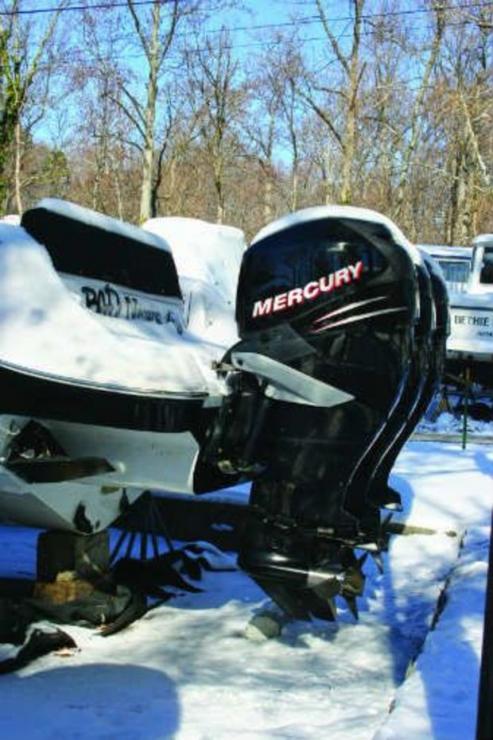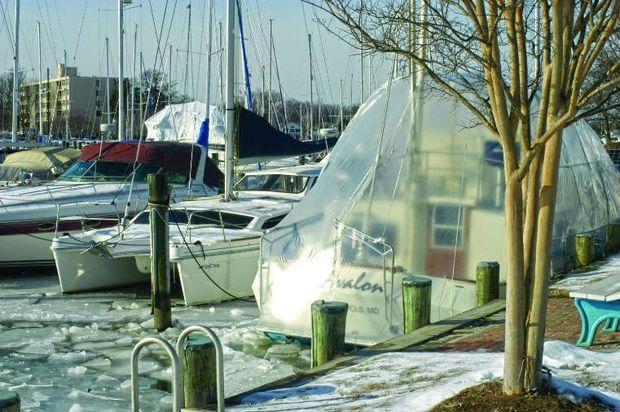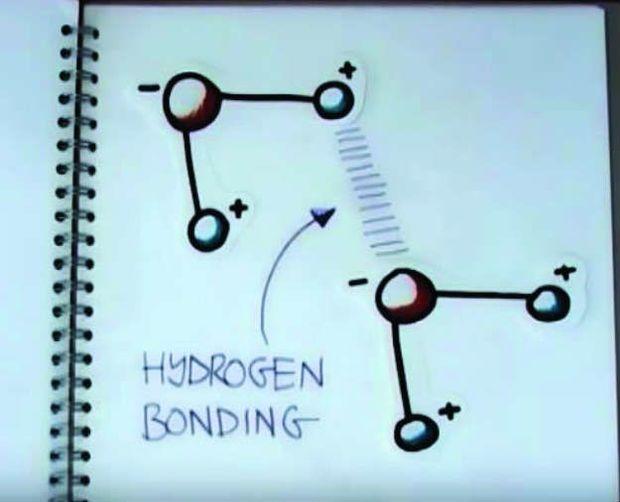When the leaves still cling to the trees, it’s hard to imagine the first morning you have to scrape the ice from your windshield. It’s even harder to imagine next spring. But if you’re going to do what’s right for your boat, you need to look to the future. Think about winter as an immediate concern, not one that only happens to New Englanders. Think about spring 2016, because if you winterize your boat well now, next May’s boat launch will go more smoothly.
Ask any boatyard manager what he or she has seen in winters past, and what you hear will make you cringe. Boats sinking under the weight of snow or due to open seacocks and valves. Boats left under cheap tarps that get torn in nor’easters and end up as tattered flags of neglect. Boats that stay in the water all winter with no visitors.
Of course, you won’t be the one to have any harm come to your boat. Especially since you’re reading these winterization tips and taking precautions to prevent any damage due to winter’s wrath. For more tips, click
here.
 In water or on shore?
In water or on shore?
Many unfortunate boaters whose boats sink every winter have one thing in common: they have failed to protect the thru-hulls by closing the seacocks and gate valves. Unless you enjoy having your boat on the bottom and the expense and time-consuming effort to raise her, close all thru-hulls except for the cockpit drains.
According to BoatU.S.: “All thru-hulls, especially the ones for the cockpit drains, must be double-clamped with stainless steel hose clamps at each end. When water freezes, it expands and will lift a poorly secured hose off of a fitting. The hose itself is also important. Lightweight hose and PVC tubing can rupture or crack. Use only a heavily reinforced hose, especially at cockpit drains.”
Although it’s the safest bet for not sinking your boat, storing her ashore adds extra exposure and vulnerability to cold air. True, your hull will develop fewer blisters than one left in the water; it’s also true that your engine and freshwater systems will get colder faster. It’s important to winterize them.
 Engine care
Engine care
When engines run, they are “happiest.” Engines that sit idle in frigid temperatures are headed for trouble. Many insurance policies do not cover frozen or cracked engine blocks, so this is critical. If your owner’s manual includes winterization procedures, follow those.
For most engines, other than your regular lubricants, you will need an aerosol can of fogging oil, a fuel stabilizer (gasoline engines) or a fuel biocide (diesel engines), and for inboards, a gallon or two of non-toxic propylene glycol antifreeze (the pink, not green stuff). The basic procedure for most engines is to flush with freshwater, empty fuel lines and carburetors, fog the carburetor intakes, drain cooling passages, fog the cylinders, and lubricate.
What to take home
Dismount electronics and take them and any other valuables home for safekeeping during those winter months during which your marina can be too quiet. Why invite theft?
Remove from the boat anything that’s scary to light a match to: cooking fuels, charcoal, coatings, and paint thinners. Don’t leave propane canisters lying around, as they may rust or leak. Do leave one functioning fire extinguisher within reach. While you are checking that off your list, check its charging status and the expiration date on your flares.
Some people like to remove their cushions from the boat; others advise leaving them propped up at odd angles to the furniture to let air circulate and fend off mildew growth. If you leave sheets or towels on the boat, putting air freshener sheets in between them keeps them fresher.
Take off all canned foods or bottled drinks. They can freeze, which may break their seals and cause a huge mess.
Cover up, clean up
Over the years, many marina managers have told us how many boats they have seen decay because their owners chose cheap tarps as winter storage covers. Your gel coat and boat overall will thank you if you invest in a good synthetic, or even better, a longer-lasting canvas cover. Frame up the cover to allow circulation and prevent water pooling. Another option, and a very good one if well-vented, is to shrink wrap your boat and keep her as protected as your holiday fruitcake basket.
Although the bimini makes a terrific July sunshade, do not expect it to protect your boat from freezing rain and snow; it’s best stowed below or in a dry place on land. Winter is a great season to have biminis cleaned.
Clean up your trailer in the fall. Clean the hubs with kerosene and butyl alcohol before repacking with grease. Sand, prime, and paint rusted areas; inspect your tires; remove the wheels; and add support at the blocks under the frame rails to minimize sagging and discourage theft.
 Visit your friend
Visit your friend
You love your boat, right? Check in on those you love. Visit your boat at least once a month during the winter, especially before and after harsh weather, or ask a friend or marina manager to check on her.
 Why does water expand when it freezes?
Why does water expand when it freezes?
“If you’ve ever seen the picture of a water molecule, it looks like a Mickey Mouse head with an oxygen molecule where Mickey Mouse’s face is, and then two hydrogen atoms where his ears are. The oxygen atom is slightly negative, and the hydrogens are slightly positively charged, so water molecules tend to stick together forming what are called hydrogen bonds.
“Because of that shape of the molecule, the way water molecules tend to link together is actually a very open structure with big holes. There’s a lot of extra ‘empty’ space. When water freezes, it releases energy because a lot of extra strong bonds can be made. It does take up more space. And so, ice expands when it freezes.” (from the University of Cambridge’s
thenakedscientists.com)
After analyzing 10 years of freeze claims, Boat U.S. Marine Insurance found that more than three quarters of claims involved cracks in the engine block or the exhaust manifolds that occured because water remained in the engine or cooling system during a hard freeze. You must drain water out of your engine in winter. See your engine owner's manual or consult a professional to learn how.
Green Winterization Tips
Courtesy of Boat U.S.
- Use less toxic propylene glycol antifreeze.
- If practical, capture any antifreeze in a bucket when flushing to prevent overboard discharges.
- When performing engine work, place an oil-only absorbent pad under the area to catch drips or small spills.
- Use small containers of oil and other hazardous cleaners; small containers mean smaller spills.
- Keep containers near the center of the boat to minimize the chance of an overboard spill.
- Temporarily plug all scuppers and drains and disable your bilge pump while performing maintenance. (Be sure to turn the bilge pump back on when finished.)
- Look for used oil and antifreeze recycling at your marina and dispose of hazardous wastes properly. Visit earth911.org to learn about local waste disposal.
 In water or on shore?
Many unfortunate boaters whose boats sink every winter have one thing in common: they have failed to protect the thru-hulls by closing the seacocks and gate valves. Unless you enjoy having your boat on the bottom and the expense and time-consuming effort to raise her, close all thru-hulls except for the cockpit drains.
According to BoatU.S.: “All thru-hulls, especially the ones for the cockpit drains, must be double-clamped with stainless steel hose clamps at each end. When water freezes, it expands and will lift a poorly secured hose off of a fitting. The hose itself is also important. Lightweight hose and PVC tubing can rupture or crack. Use only a heavily reinforced hose, especially at cockpit drains.”
Although it’s the safest bet for not sinking your boat, storing her ashore adds extra exposure and vulnerability to cold air. True, your hull will develop fewer blisters than one left in the water; it’s also true that your engine and freshwater systems will get colder faster. It’s important to winterize them.
In water or on shore?
Many unfortunate boaters whose boats sink every winter have one thing in common: they have failed to protect the thru-hulls by closing the seacocks and gate valves. Unless you enjoy having your boat on the bottom and the expense and time-consuming effort to raise her, close all thru-hulls except for the cockpit drains.
According to BoatU.S.: “All thru-hulls, especially the ones for the cockpit drains, must be double-clamped with stainless steel hose clamps at each end. When water freezes, it expands and will lift a poorly secured hose off of a fitting. The hose itself is also important. Lightweight hose and PVC tubing can rupture or crack. Use only a heavily reinforced hose, especially at cockpit drains.”
Although it’s the safest bet for not sinking your boat, storing her ashore adds extra exposure and vulnerability to cold air. True, your hull will develop fewer blisters than one left in the water; it’s also true that your engine and freshwater systems will get colder faster. It’s important to winterize them.
 Engine care
When engines run, they are “happiest.” Engines that sit idle in frigid temperatures are headed for trouble. Many insurance policies do not cover frozen or cracked engine blocks, so this is critical. If your owner’s manual includes winterization procedures, follow those.
For most engines, other than your regular lubricants, you will need an aerosol can of fogging oil, a fuel stabilizer (gasoline engines) or a fuel biocide (diesel engines), and for inboards, a gallon or two of non-toxic propylene glycol antifreeze (the pink, not green stuff). The basic procedure for most engines is to flush with freshwater, empty fuel lines and carburetors, fog the carburetor intakes, drain cooling passages, fog the cylinders, and lubricate.
What to take home
Dismount electronics and take them and any other valuables home for safekeeping during those winter months during which your marina can be too quiet. Why invite theft?
Remove from the boat anything that’s scary to light a match to: cooking fuels, charcoal, coatings, and paint thinners. Don’t leave propane canisters lying around, as they may rust or leak. Do leave one functioning fire extinguisher within reach. While you are checking that off your list, check its charging status and the expiration date on your flares.
Some people like to remove their cushions from the boat; others advise leaving them propped up at odd angles to the furniture to let air circulate and fend off mildew growth. If you leave sheets or towels on the boat, putting air freshener sheets in between them keeps them fresher.
Take off all canned foods or bottled drinks. They can freeze, which may break their seals and cause a huge mess.
Cover up, clean up
Over the years, many marina managers have told us how many boats they have seen decay because their owners chose cheap tarps as winter storage covers. Your gel coat and boat overall will thank you if you invest in a good synthetic, or even better, a longer-lasting canvas cover. Frame up the cover to allow circulation and prevent water pooling. Another option, and a very good one if well-vented, is to shrink wrap your boat and keep her as protected as your holiday fruitcake basket.
Although the bimini makes a terrific July sunshade, do not expect it to protect your boat from freezing rain and snow; it’s best stowed below or in a dry place on land. Winter is a great season to have biminis cleaned.
Clean up your trailer in the fall. Clean the hubs with kerosene and butyl alcohol before repacking with grease. Sand, prime, and paint rusted areas; inspect your tires; remove the wheels; and add support at the blocks under the frame rails to minimize sagging and discourage theft.
Engine care
When engines run, they are “happiest.” Engines that sit idle in frigid temperatures are headed for trouble. Many insurance policies do not cover frozen or cracked engine blocks, so this is critical. If your owner’s manual includes winterization procedures, follow those.
For most engines, other than your regular lubricants, you will need an aerosol can of fogging oil, a fuel stabilizer (gasoline engines) or a fuel biocide (diesel engines), and for inboards, a gallon or two of non-toxic propylene glycol antifreeze (the pink, not green stuff). The basic procedure for most engines is to flush with freshwater, empty fuel lines and carburetors, fog the carburetor intakes, drain cooling passages, fog the cylinders, and lubricate.
What to take home
Dismount electronics and take them and any other valuables home for safekeeping during those winter months during which your marina can be too quiet. Why invite theft?
Remove from the boat anything that’s scary to light a match to: cooking fuels, charcoal, coatings, and paint thinners. Don’t leave propane canisters lying around, as they may rust or leak. Do leave one functioning fire extinguisher within reach. While you are checking that off your list, check its charging status and the expiration date on your flares.
Some people like to remove their cushions from the boat; others advise leaving them propped up at odd angles to the furniture to let air circulate and fend off mildew growth. If you leave sheets or towels on the boat, putting air freshener sheets in between them keeps them fresher.
Take off all canned foods or bottled drinks. They can freeze, which may break their seals and cause a huge mess.
Cover up, clean up
Over the years, many marina managers have told us how many boats they have seen decay because their owners chose cheap tarps as winter storage covers. Your gel coat and boat overall will thank you if you invest in a good synthetic, or even better, a longer-lasting canvas cover. Frame up the cover to allow circulation and prevent water pooling. Another option, and a very good one if well-vented, is to shrink wrap your boat and keep her as protected as your holiday fruitcake basket.
Although the bimini makes a terrific July sunshade, do not expect it to protect your boat from freezing rain and snow; it’s best stowed below or in a dry place on land. Winter is a great season to have biminis cleaned.
Clean up your trailer in the fall. Clean the hubs with kerosene and butyl alcohol before repacking with grease. Sand, prime, and paint rusted areas; inspect your tires; remove the wheels; and add support at the blocks under the frame rails to minimize sagging and discourage theft.
 Visit your friend
You love your boat, right? Check in on those you love. Visit your boat at least once a month during the winter, especially before and after harsh weather, or ask a friend or marina manager to check on her.
Visit your friend
You love your boat, right? Check in on those you love. Visit your boat at least once a month during the winter, especially before and after harsh weather, or ask a friend or marina manager to check on her.
 Why does water expand when it freezes?
“If you’ve ever seen the picture of a water molecule, it looks like a Mickey Mouse head with an oxygen molecule where Mickey Mouse’s face is, and then two hydrogen atoms where his ears are. The oxygen atom is slightly negative, and the hydrogens are slightly positively charged, so water molecules tend to stick together forming what are called hydrogen bonds.
“Because of that shape of the molecule, the way water molecules tend to link together is actually a very open structure with big holes. There’s a lot of extra ‘empty’ space. When water freezes, it releases energy because a lot of extra strong bonds can be made. It does take up more space. And so, ice expands when it freezes.” (from the University of Cambridge’s thenakedscientists.com)
After analyzing 10 years of freeze claims, Boat U.S. Marine Insurance found that more than three quarters of claims involved cracks in the engine block or the exhaust manifolds that occured because water remained in the engine or cooling system during a hard freeze. You must drain water out of your engine in winter. See your engine owner's manual or consult a professional to learn how.
Green Winterization Tips
Courtesy of Boat U.S.
Why does water expand when it freezes?
“If you’ve ever seen the picture of a water molecule, it looks like a Mickey Mouse head with an oxygen molecule where Mickey Mouse’s face is, and then two hydrogen atoms where his ears are. The oxygen atom is slightly negative, and the hydrogens are slightly positively charged, so water molecules tend to stick together forming what are called hydrogen bonds.
“Because of that shape of the molecule, the way water molecules tend to link together is actually a very open structure with big holes. There’s a lot of extra ‘empty’ space. When water freezes, it releases energy because a lot of extra strong bonds can be made. It does take up more space. And so, ice expands when it freezes.” (from the University of Cambridge’s thenakedscientists.com)
After analyzing 10 years of freeze claims, Boat U.S. Marine Insurance found that more than three quarters of claims involved cracks in the engine block or the exhaust manifolds that occured because water remained in the engine or cooling system during a hard freeze. You must drain water out of your engine in winter. See your engine owner's manual or consult a professional to learn how.
Green Winterization Tips
Courtesy of Boat U.S.